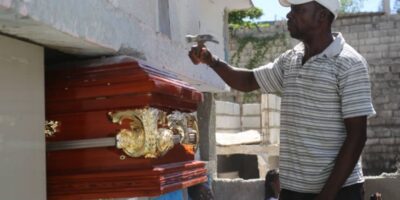For the right of passage, armed bandits charge drivers a toll on the road, both when coming and going. The latter must pay without flinching
Due to abuses perpetrated by armed bandits along the main roads, in particular Route (routes nationales) one, two and three linking Port-au-Prince to other towns in the country, more and more drivers are forced to abandon the public transport sector in Haiti, according to union officials contacted by AyiboPost.
Christophe Patrick illustrates this trend. For 26 years, this driver serviced the Port-au-Prince/Saint-Marc route. But three years ago, to reassure his family who worried too much every time he hit the road, he ended up giving up.
“In addition to the passage fees of 4,000 gourdes demanded by the bandits, Route 1 had become too risky because of their operations in Canaan,” he says.
Because of the abuses perpetrated by armed bandits along the main roads […], more and more drivers are forced to abandon the public transport sector in Haiti.
For some time now, gangs settling at the southern and northern entrances to Port-au-Prince have been fearlessly engaging in all sorts of misdeeds.
Kidnapping, ransoms, tolls, theft of goods and vehicles, and other inconveniences are the bitter reality of those who frequent Route 1 and 2.
While some drivers agree to pay passage to armed bandits or to change routes, others turn to activities deemed less risky to earn a living.
Read also : Photos | Des camions prennent la mer à Carrefour pour rentrer à Port-au-Prince
Peterson Prévost was a bus driver. He serviced the Port-au-Prince / Jacmel route for ten years.
Between sobs and anger, he recounts to AyiboPost the worst moment he experienced on the road to Martissant one day in 2022.
The man remembers being caught in a monstrous traffic jam on Route 2 in Martissant, which lasted nearly eight hours.
Around 7 PM, the flow of vehicles finally began to clear. He was relieved to be able to restart his engine and to get back on the road to return home to his family.
Just as he was about to move, a bandit robbed him and demanded all of the money he made that day. For fear of being killed, he had to give everything to them. “That night I lived the worst moment of my life. I went home dejected, sad, frustrated. I told myself that I would never set foot in Port-au-Prince again,” explains Prévost.
The gangs settling at the southern and northern entrances to Port-au-Prince are fearlessly engaging in all sorts of misdeeds.
The situation is extremely frustrating. « Every year, we pay taxes to the State, we also pay into the Road Maintenance Fund (FER), and now we are forced to pay exorbitant passage fees to bandits, it’s unfair, » deems the professional.
It is the same for Paul Yoli, 62, also a driver servicing the Port-au-Prince / Jacmel route for twenty something years.
Kidnapped in November 2022 in Martissant, he was released for ransom a day later. The man still recalls the horrible memories of the inhuman conditions of his sequestration.
« Now I farm the land to be able to take care of my family, » he said, his voice cracking.
Every year, we pay taxes to the State, we also pay into the Road Maintenance Fund (FER), and now we are forced to pay exorbitant passage fees to bandits, it’s unfair.
For the right of passage, armed bandits charge drivers a toll on the road, both when coming and going. The latter must pay without flinching.
At the southern entrance to the capital, two tolls have been erected. One in Martissant, the other in Fontamara.
« Before, I paid 3000 gourdes at Fontamara and 2000 at Martissant, » says Yoli. “Now it is 5,000 and 4,000 gourdes respectively. Notwithstanding the constant risk of being hit by a stray bullet,” continues Yoli, who says that he is not in a position to pay these fees, which represent more than half of what he could earn on each trip.
Read also : Les gangs se livrent au piratage des bateaux en Haïti
The situation is similar at the northern entrance to the capital. Fewer and fewer public transport vehicles are seen on the road.
“Before, there could be twenty-five to thirty buses using the road. Now, it is sometimes reduced to only five or six, » reports Alix Duverger, spokesperson for the Syndicate of Drivers and Vehicles Owners of Bas-Artibonite (Syndicat des chauffeurs et propriétaires de véhicules du Bas-Artibonite), acknowledging that drivers are also using alternative routes to avoid facing the armed bandits.
“The public transport sector is on its knees,” Duverger argues.
For the right of passage, armed bandits charge drivers a toll on the road, both when coming and going. The latter must pay without flinching.
In his annual report presented in December 2022, the president of the Haitian Association of Owners and Drivers of Haiti (APCH), Méhu Changeux, outlined the enormous difficulties facing the sector.
Over fifteen drivers killed and more than 132 people (drivers and passengers) kidnapped and then released for ransom, as well as over 70 transport vehicles burned by bandits and over 20 others stolen by gangs in downtown Port-au-Prince.
“Since the police fled the Martissant sub-station in December 2021, the bandits have found it easier to operate on the road. This accelerated driver attrition, ”explains Petrus Leriche, secretary to the APCH.
Read also : Les gangs multiplient les attaques contre les bateaux au large de Port-au-Prince
It must be said that drivers are not the only ones to suffer the fate of these armed men, Leriche told AyiboPost.
Passengers also suffer the same ordeal.
This is the case, for example, of the female merchants (madan sara) who can no longer circulate like before, and the professionals who have to be transferred so as not to have to cross « the valley of death that is Martissant, » he explains.
At the southern entrance to the capital, two tolls have been erected. One in Martissant, the other in Fontamara.
Meanwhile, transport costs have more than doubled since the installation of these toll booths.
For example, the Port-au-Prince/Saint-Marc journey which was 500 gourdes, has now increased to 1500 gourdes via Canaan.
« We are trying to resist. Because as long as there are people on the move, there will be drivers on the roads. However, it must be noted that the sector is increasingly undermined by armed men, » Leriche told AyiboPost.
English translation by Sarah Jean.
Cover image : a public transportation bus in Haiti | © Andy Morgan Writes
Stay in touch with AyiboPost through :









Comments